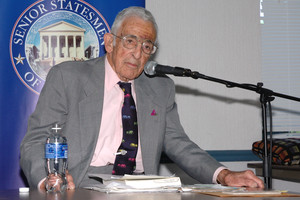Reflections on the Supreme Court
Sunday, November 17th, 2013 What are our most important recent decisions? How would our founding fathers view them? What happens when a new Supreme Court justice needs to be appointed? Can a non-lawyer serve on the Supreme Court?
What are our most important recent decisions? How would our founding fathers view them? What happens when a new Supreme Court justice needs to be appointed? Can a non-lawyer serve on the Supreme Court?
What differences have the current justices made individually? Or from a gender standpoint, since there are now four women members for the first time in history? Does race make a difference in decisions? Should we have more members of the Supreme Court, as Roosevelt attempted?
These questions were answered at the November 13, 2013 meeting and a recording is available below. The program was moderated by SSV board member Charles Smith.
[display_podcast]
Henry J. Abraham, James Hart Professor of Government Emeritus at the University of Virginia, graduated from Kenyon College in 1948 with a bachelor’s degree in political science, first in his class, summa cum laude and Phi Beta Kappa. He earned his M.A. in public law and government from Columbia University in 1949, and received his Ph.D. in political science from the University of Pennsylvania in 1952, where he began his teaching career. In 1972 Dr. Abraham became a chaired professor in the Department of Government and Foreign Affairs at the University of Virginia. In 1983 he was awarded the University’s most prestigious recognition, the Thomas Jefferson Award, and in 1993 he received the First Lifetime Achievement Award of the Organized Section on Law and Courts of the American Political Science Association. He retired from full-time teaching in 1997 after nearly a half-century in the classroom.
Professor Abraham is a leading authority on constitutional law, civil rights and liberties, and the judicial process. A pioneer in comparative judicial studies, he has served as a Fulbright Scholar in Denmark and has lectured throughout the world. The author of 13 books in 48 editions including The Judicial Process: An Introductory Analysis of the Courts of the United States, England and France, 7th ed., and Freedom and the Court: Civil Rights and Liberties in the United States, 8th ed., he continues to research, publish and lecture. His most recent book is Justices, Presidents and Senators: A History of Supreme Court Appointments from Washington to Bush II. In addition, he has published more than one hundred articles, book chapters, essays and monographs. His record of civic and university service is as long as it is distinguished.
Henry and his wife Mildred, a rare books collector and bibliographer, live in Charlottesville. They have two sons and four grandchildren.
Program Summary
Dr. Abraham’s presentation should be heard on podcast to be appreciated, but here is a sampling of the points he addressed.
The courts represent the favorable choice of more Americans by 10-20 percentage points over the other two branches of government.
The constitution includes two very significant concepts with regard to the Supreme Court. First, who is on the court (the members are not elected but rather nominated by the president and confirmed by the Senate); and second, their perception of their judicial role, which is the line between judicial activism and judicial restraint. There are phrases in the constitution which explains why the court so frequently seems to be out of balance.
There are four reasons why presidents select people for the judiciary: merit, political and personal friendship, a person’s real politics, and the notion of representativeness. The presidents have done pretty well with selecting members of merit. Only one member has been impeached and he was not convicted; indeed, he was a good jurist but he just had a big mouth. Of the 112 members who have served on the Supreme Court, Dr. Abraham considers only six as failures. He says that 12 are regarded as giants and great justices. The current court is okay!
Religion is one of the representative notions, but the present court is not characteristic. Historically, there have been 92 Protestants, 12 Catholics and eight Jews, of the 112 members. The present court has six Catholics and three Jews. However, religion does not play a major role in their positions on cases.
A typical perception is that there is a great deal of strife on the court. Actually, the strife is embedded in the cases, and when it comes to their personal and social relationships, the justices are all quite friendly and socialize together.
The current nine-judge court is divided four liberals to four conservatives, with Anthony Kennedy, who is basically a conservative, but who likes to be in the middle. Chief Justice John G. Roberts is a conservative. The most conservative member is Samuel A. Alito, although Antonin Scalia and Clarence Thomas are very close. Stephen G. Breyer and all three women, Sonia Sotomayor, Elena Kagan, and Ruth Bader Ginsburg, are liberals with Justice Ginsberg the most liberal.
